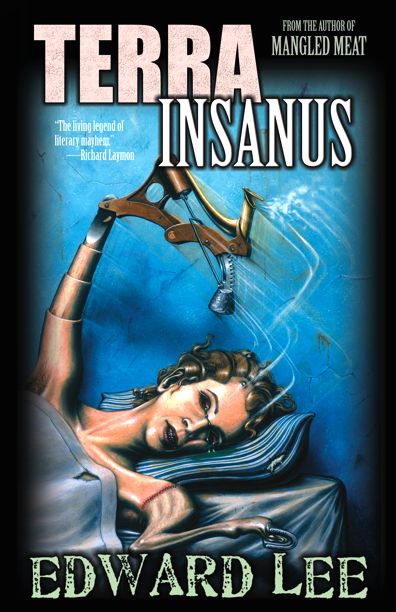
Terra Insanus by Edward Lee
I’ve read three of Edward Lee’s novels and enjoyed them all. They were schlocky, exploitative and fun to read. Before mass market horror collapsed, Lee’s novels pushed the boundaries of good taste and earned him a spot as as a leading name in the splatterpunk movement.
Outside of the mainstream, Lee was publishing even more extreme works through small and independent presses. These works were often released as limited editions and were infamous in how revolting their content was. Deadite Press (NSFW) has been working to release these infamous stories to a wider audience.
I haven’t read much of Edward Lee’s short work, but what I have read was very hit or miss. For example, I have no idea how the hell “Mr. Torso” was nominated for a Bram Stoker Award for Short Fiction because it’s completely terrible. So when Deadite Press sent me a copy of his new collection, Terra Insanus, I didn’t go in with high expectations.
The first story, “The Stick Woman,” is one of Lee’s most notorious. There’s a good reason for its reputation. This is one of the most disgusting and disturbing short stories I’ve ever read. I could summarize the plot, but frankly, I just don’t want to. I want to praise it, but that just feels wrong. I feel like this story is beyond any kind of discussion or review that I’m capable of. If you end up picking up this collection, just keep in mind that you can’t unread something.
The next two stories, “Shit-House” and “The Ushers,” are companion pieces that share style, theme and some characters. Lee engages in some experimental writing here that pleasantly surprised me in how well he pulled it off. He showed some shades of this in The Black Train/Gast, but this is some of Lee’s best work craft-wise. He manages to create mood pieces reminiscent of some of Thomas Ligotti’s experimental pieces and a more accessible Peter Sotos-esque style.
In “Shit-House,” the unnamed protagonist contemplates the world, concludes it’s a terrible place and decides to do something about it. It’s a very simple plot, but as mentioned previously, this story is more of a mood piece. The story shifts perspectives and hops around to various vignettes that create an oppressively bleak atmosphere.
Trade deficit bedamned(sic)! Who says foreign countries don’t by U.S. goods? The Chilean Secret Police once used, specifically, Black and Decker power tools with which to torture “political” offenders.
It’s a name you can trust. Black and Decker.
There’s a lot of bitter humor in this story as well. You get the impression the protagonist is using this to keep himself sane in the way doctors develop a morbid sense of humor to distance themselves from the awful things to have to see. However, it doesn’t work for the protagonist.
But seeing is what he must always do. It is a curse. He is helpless.
He has to see
He has to see what the world is.
Like “Shit-House,” “The Ushers” has a rather simple plot but written in an very affective way. A writer is being stalked by demonic creatures that he calls “the ushers.” In this story, Edward Lee turns the misanthropy of the last two stories inward. The writer of this story is an obvious stand in for Lee himself. He expresses his own fears of Hell and death, regrets in his life and his encounters of the supernatural.
You live alone. You
dial your number by mistake
and someone answers.
A character named Sergeant Sand that appeared in the “Shit-House” appears here as well. He’s an abrasive and all around awful human that took pleasure in committing atrocities in Vietnam. He brags about his senseless murders and rapes to Lee and even shows him photos.
Yeah. Back then I thought Sergeant Sand was cool. I wanted to be Sergeant Sand.
God forgive me.
The usher creatures are obviously more metaphorical than literal. In some of his stories (like the aforementioned “Mr. Torso.”) Lee attempts to weave philosophy into his stories and just comes off as ridiculous and pompous. Here, Lee managed to tell a tale about the relation between a writer and his stories that’s both interesting and subtle.
He gives them a scene in all of his books. The ushers.
It seems appropriate. After all, he’s a horror novelist.
Well, the story is subtle in it’s message. His descriptions of the ushers and their duties in Hell are as over the top as anything he’s ever written. I think this shows what Lee is capable of as a writer. He balances the horror of the usher creatures and his story of the writer and his work very well.
What is… that?
A figure in the dark?
Footsteps?
Is it me?
Or is it getting hot in here?
Things get derailed in the final story, “The Sea-Slop Thing.” This is the only story in here that isn’t a reprint. And I wonder why the hell he chose this collection to publish this story. The previous stories were all bleak tales of suffering and misanthropy. This goofy sex comedy sticks out like a priapism with gangrene.
By itself, it’s not completely terrible. June is a down and out woman living in a port town whose luck takes a turn for the better when she meets a horny sea monster. The plot isn’t bad and it has some pretty funny moments.
Fishy chuckled. “Yeah, I heard. You got canned from the deli ‘cos Zefowitz caught ya stickin’ a leg of lamb in your cookie.”
Steam may very well have shot from June’s ears. “It was a Chorizo sausage, not a leg of fuckin’ lamb! And-and, it’s not true! And where did you hear that?”
The comic tone keeps some of the flaws, like the parade of redneck caricatures, from being too overwhelming. It keeps some of the terrible sex writing from ruining the story as well. If Lee meant this story to be at all erotic? Holy crap, did he fail.
Her loins felt like a pot of Sex Stew, bubbling, roiling, cringing to be stirred, and she knew she was undergoing some serious hormonal or cerbo-chemical change.
Blech.
The only reason I can think that Lee included this is to balance out the bleakness of the first three stories. If he wanted to do that, this collection should have had at least one more story in this vein. The collection is already short at only 100 pages, so it wouldn’t have hurt to include another lighter story if he or Deadite wanted to go that route.
Besides the length, my other complaint is that copy editing in the collection leaves a lot to be desired. You can see this in some of the above quotations, which I took verbatim from my review copy. There are way too many typos here for a book this short.
Overall, bad copy editing aside, I can’t say this was a awful collection. Three of the four stories are spot on, and the worst story’s worst flaw is that it belongs somewhere else. Still, this one is for people who are already big fans of Edward Lee. For everyone else, I’d recommend one of his novels instead. Most of his mass market novels are back in print through Necro Publications. I’d recommend Gast (previously published as The Black Train) especially.
______________
 Ben Arzate lives in Des Moines, Iowa. His fiction and poetry has appeared in Ugly Babies, Bizarro Central, Spoilage, The Mustache Factor, Twenty Something Press, and Keep This Bag Away From Children. He blogs at http://dripdropdripdropdripdrop.blogspot.com/
Ben Arzate lives in Des Moines, Iowa. His fiction and poetry has appeared in Ugly Babies, Bizarro Central, Spoilage, The Mustache Factor, Twenty Something Press, and Keep This Bag Away From Children. He blogs at http://dripdropdripdropdripdrop.blogspot.com/
Subscribe to Adventures in SciFi Publishing podcast on: iTunes | Stitcher Radio (Android users) | RSS | Website RSS | AISFP Wormhole newsletter

















Speak Your Mind